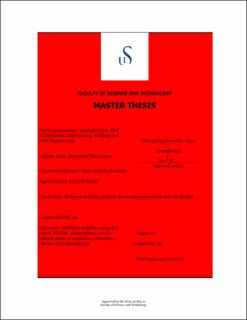| dc.contributor.advisor | Skadsem, Hans Joakim | |
| dc.contributor.advisor | Omdal, Edvard | |
| dc.contributor.author | Diaz Lopez, Jairo Alexander | |
| dc.date.accessioned | 2022-09-21T15:51:35Z | |
| dc.date.issued | 2022 | |
| dc.identifier | no.uis:inspera:108215571:64372155 | |
| dc.identifier.uri | https://hdl.handle.net/11250/3020288 | |
| dc.description.abstract | The drilling of extended-reach wells is an increasingly common practice to reduce costs in exploration and development of mature fields. Extended-reach wells are technically challenge, as high inclination trajectories may predispose to borehole instability.
This thesis studies an extended-reach well drilled in the Ekofisk field in the North Sea where borehole stability issues were observed and eventually resulted in the loss of the well. A wellbore stability assessment is performed with well-specific stress and formation strength data that explores the possible failures the well may have suffered from. Uncertainty is propagated both in rock strength and anisotropy to generate a mud window that acknowledges the variability present in geomechanical data using a Monte Carlo approach.
It is observed that three parameters from the plane of weakness present a high degree of uncertainty: cohesion, friction factor and orientation. The impact this parameters have in the failure along the planes of weakness pressure is studied. A safe mud window generated with a stochastic approach is presented. Acknowledging for uncertainty and the failure along the weakness planes in extended-reach wells to be drilled in Ekofisk may generate safer mud windows that in turn reduce the occurrence of wellbore instability in the field. | |
| dc.description.abstract | | |
| dc.language | eng | |
| dc.publisher | UIS | |
| dc.title | Wellbore stability analysis for an extended-reach well on Ekofisk | |
| dc.type | Master thesis | |
